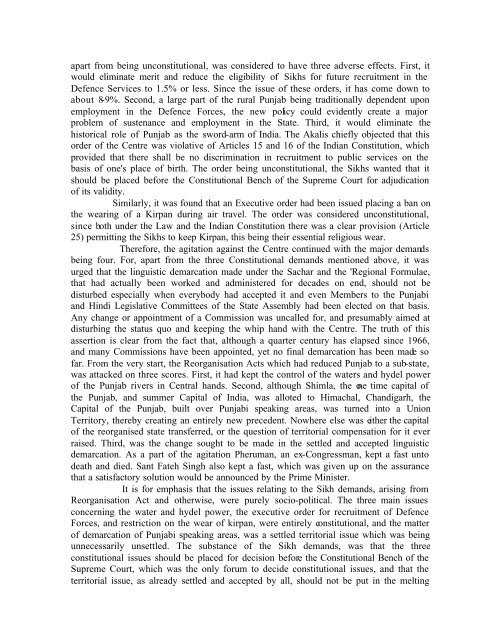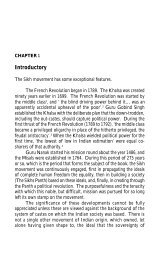Fundamentalism and the Sikh Religious Tradition by T.N. Madan
Fundamentalism and the Sikh Religious Tradition by T.N. Madan
Fundamentalism and the Sikh Religious Tradition by T.N. Madan
You also want an ePaper? Increase the reach of your titles
YUMPU automatically turns print PDFs into web optimized ePapers that Google loves.
apart from being unconstitutional, was considered to have three adverse effects. First, it<br />
would eliminate merit <strong>and</strong> reduce <strong>the</strong> eligibility of <strong>Sikh</strong>s for future recruitment in <strong>the</strong><br />
Defence Services to 1.5% or less. Since <strong>the</strong> issue of <strong>the</strong>se orders, it has come down to<br />
about 8-9%. Second, a large part of <strong>the</strong> rural Punjab being traditionally dependent upon<br />
employment in <strong>the</strong> Defence Forces, <strong>the</strong> new policy could evidently create a major<br />
problem of sustenance <strong>and</strong> employment in <strong>the</strong> State. Third, it would eliminate <strong>the</strong><br />
historical role of Punjab as <strong>the</strong> sword-arm of India. The Akalis chiefly objected that this<br />
order of <strong>the</strong> Centre was violative of Articles 15 <strong>and</strong> 16 of <strong>the</strong> Indian Constitution, which<br />
provided that <strong>the</strong>re shall be no discrimination in recruitment to public services on <strong>the</strong><br />
basis of one's place of birth. The order being unconstitutional, <strong>the</strong> <strong>Sikh</strong>s wanted that it<br />
should be placed before <strong>the</strong> Constitutional Bench of <strong>the</strong> Supreme Court for adjudication<br />
of its validity.<br />
Similarly, it was found that an Executive order had been issued placing a ban on<br />
<strong>the</strong> wearing of a Kirpan during air travel. The order was considered unconstitutional,<br />
since both under <strong>the</strong> Law <strong>and</strong> <strong>the</strong> Indian Constitution <strong>the</strong>re was a clear provision (Article<br />
25) permitting <strong>the</strong> <strong>Sikh</strong>s to keep Kirpan, this being <strong>the</strong>ir essential religious wear.<br />
Therefore, <strong>the</strong> agitation against <strong>the</strong> Centre continued with <strong>the</strong> major dem<strong>and</strong>s<br />
being four. For, apart from <strong>the</strong> three Constitutional dem<strong>and</strong>s mentioned above, it was<br />
urged that <strong>the</strong> linguistic demarcation made under <strong>the</strong> Sachar <strong>and</strong> <strong>the</strong> 'Regional Formulae,<br />
that had actually been worked <strong>and</strong> administered for decades on end, should not be<br />
disturbed especially when everybody had accepted it <strong>and</strong> even Members to <strong>the</strong> Punjabi<br />
<strong>and</strong> Hindi Legislative Committees of <strong>the</strong> State Assembly had been elected on that basis.<br />
Any change or appointment of a Commission was uncalled for, <strong>and</strong> presumably aimed at<br />
disturbing <strong>the</strong> status quo <strong>and</strong> keeping <strong>the</strong> whip h<strong>and</strong> with <strong>the</strong> Centre. The truth of this<br />
assertion is clear from <strong>the</strong> fact that, although a quarter century has elapsed since 1966,<br />
<strong>and</strong> many Commissions have been appointed, yet no final demarcation has been made so<br />
far. From <strong>the</strong> very start, <strong>the</strong> Reorganisation Acts which had reduced Punjab to a sub-state,<br />
was attacked on three scores. First, it had kept <strong>the</strong> control of <strong>the</strong> waters <strong>and</strong> hydel power<br />
of <strong>the</strong> Punjab rivers in Central h<strong>and</strong>s. Second, although Shimla, <strong>the</strong> one time capital of<br />
<strong>the</strong> Punjab, <strong>and</strong> summer Capital of India, was alloted to Himachal, Ch<strong>and</strong>igarh, <strong>the</strong><br />
Capital of <strong>the</strong> Punjab, built over Punjabi speaking areas, was turned into a Union<br />
Territory, <strong>the</strong>re<strong>by</strong> creating an entirely new precedent. Nowhere else was ei<strong>the</strong>r <strong>the</strong> capital<br />
of <strong>the</strong> reorganised state transferred, or <strong>the</strong> question of territorial compensation for it ever<br />
raised. Third, was <strong>the</strong> change sought to be made in <strong>the</strong> settled <strong>and</strong> accepted linguistic<br />
demarcation. As a part of <strong>the</strong> agitation Pheruman, an ex-Congressman, kept a fast unto<br />
death <strong>and</strong> died. Sant Fateh Singh also kept a fast, which was given up on <strong>the</strong> assurance<br />
that a satisfactory solution would be announced <strong>by</strong> <strong>the</strong> Prime Minister.<br />
It is for emphasis that <strong>the</strong> issues relating to <strong>the</strong> <strong>Sikh</strong> dem<strong>and</strong>s, arising from<br />
Reorganisation Act <strong>and</strong> o<strong>the</strong>rwise, were purely socio-political. The three main issues<br />
concerning <strong>the</strong> water <strong>and</strong> hydel power, <strong>the</strong> executive order for recruitment of Defence<br />
Forces, <strong>and</strong> restriction on <strong>the</strong> wear of kirpan, were entirely constitutional, <strong>and</strong> <strong>the</strong> matter<br />
of demarcation of Punjabi speaking areas, was a settled territorial issue which was being<br />
unnecessarily unsettled. The substance of <strong>the</strong> <strong>Sikh</strong> dem<strong>and</strong>s, was that <strong>the</strong> three<br />
constitutional issues should be placed for decision before <strong>the</strong> Constitutional Bench of <strong>the</strong><br />
Supreme Court, which was <strong>the</strong> only forum to decide constitutional issues, <strong>and</strong> that <strong>the</strong><br />
territorial issue, as already settled <strong>and</strong> accepted <strong>by</strong> all, should not be put in <strong>the</strong> melting
















